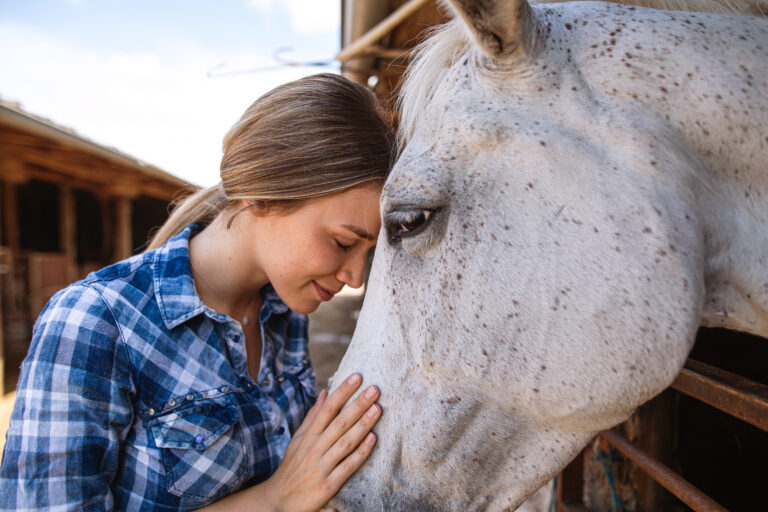As horses age, their needs change, and it’s essential to adapt our approach to gentle riding for older horses. Much like humans, horses can continue to enjoy an active and fulfilling life well into their senior years, given the right care and attention. In this article, we’ll explore how to ensure our older equine friends remain healthy, happy, and active through gentle riding practices.

Understanding the Needs of Older Horses
Older horses may not have the same energy levels as they did in their youth, but they can still enjoy and benefit from gentle riding. The key is understanding their physical limitations and adjusting our expectations and routines accordingly.
Recognizing Signs of Aging in Horses
As horses age, they may exhibit signs such as stiffness, reduced stamina, or changes in weight. Regular veterinary check-ups are crucial in monitoring these changes and ensuring they don’t affect the horse’s quality of life. For more information on what to expect during senior horse check-ups, visit senior horse check-ups.
Adjusting Riding Routines
When it comes to gentle riding for older horses, its important to modify routines to accommodate their changing needs. This may include shorter rides, more frequent breaks, and less intense physical demands. Always prioritize the horse’s comfort and well-being.
The Importance of Conditioning
Maintaining a fitness routine is vital for older horses. Conditioning exercises help preserve muscle tone, flexibility, and overall health, which are essential for gentle riding. Learn more about effective conditioning practices at exercise for older horses.
Stretching and Flexibility
Incorporating stretching into your horse’s routine can greatly enhance their flexibility and help prevent injuries. Senior horse stretching routines can be a valuable resource in maintaining their physical health. To explore stretching techniques, check out stretching routines.
Proper Nutrition and Hydration
A balanced diet tailored to the needs of older horses is critical. Older horses may require specific dietary adjustments to ensure they receive all necessary nutrients. Additionally, proper hydration is crucial, especially during warmer months. For tips on maintaining hydration, refer to hydration tips.
For more detailed information on diet and health care for older horses, visit diet and health care for older horses.
Creating a Comfortable Riding Environment
A comfortable environment is key to successful gentle riding for older horses. Pay attention to the horse’s comfort both during and after rides.
Choosing the Right Equipment
Using well-fitted tack is essential to prevent discomfort and potential injuries. Regularly check and adjust tack to ensure it remains appropriate as the horse’s body changes with age.
Monitoring Weather Conditions
Older horses can be more sensitive to extreme weather conditions. Ensure rides are planned during favorable weather, avoiding extreme heat or cold, which can be taxing on senior horses.
Emotional Well-being of Older Horses
Just like humans, horses have emotional needs that must be addressed to keep them happy and content. Ensuring their emotional well-being is an integral part of gentle riding.
Engaging Activities
Incorporate activities that stimulate the horse mentally and physically. Groundwork and light trail rides can be enjoyable and beneficial for older horses.
Social Interaction
Maintaining social connections with other horses can positively impact an older horse’s mental health. If feasible, allow for regular interaction with other horses.
Common Challenges and Solutions
Despite best efforts, challenges may arise when caring for older horses. Here are some common issues and potential solutions.
Dealing with Stiffness
Stiffness is a common issue in older horses. Regular stretching, proper warm-ups, and joint supplements can help alleviate stiffness.
Maintaining Digestive Health
Digestive issues can be prevalent in older horses. Providing appropriate digestive support can aid in maintaining a healthy digestive system.
Conclusion
Gentle riding for older horses allows them to continue enjoying life while maintaining physical and mental health. By understanding their needs and adapting our care, we can ensure our equine companions age gracefully and happily.

FAQ
How often should older horses be ridden?
Older horses should be ridden based on their individual needs and health status. Generally, shorter, more frequent sessions are beneficial.
What is the best diet for an older horse?
A diet high in fiber and low in sugar, with added vitamins and minerals, is often recommended for older horses. Consulting a veterinarian for personalized advice is essential.
How can I tell if my older horse is comfortable with riding?
Observe your horse’s behavior and physical condition. Signs of discomfort may include reluctance to move, changes in gait, or visible signs of distress.
This article contains affiliate links. We may earn a commission at no extra cost to you.
